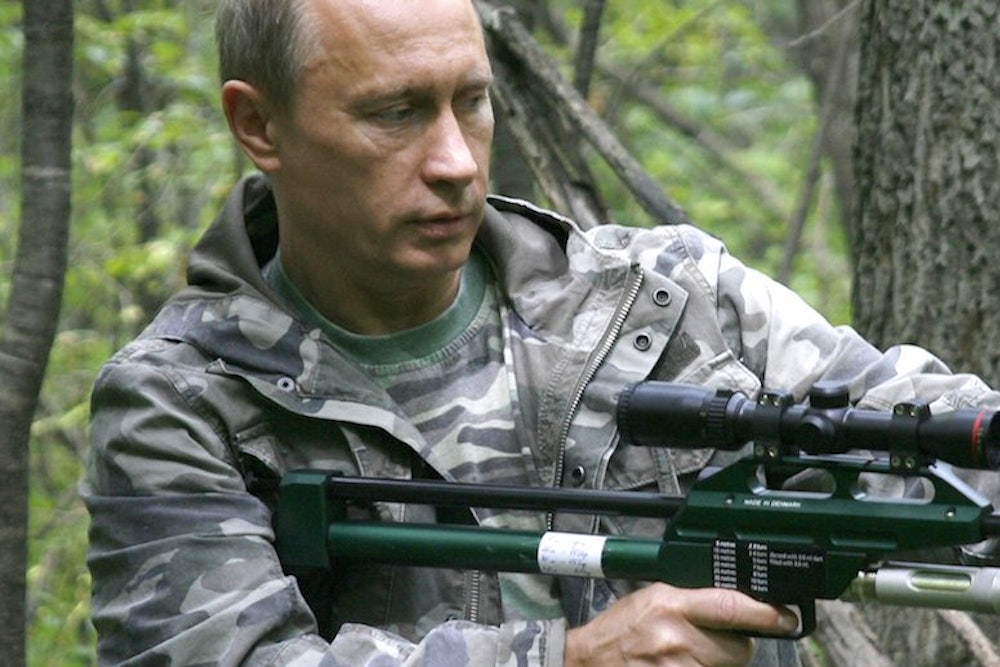With Vladimir Putin annexing Crimea, inciting violence in Eastern Ukraine, and threatening his neighbor with a massive military buildup, an oft-repeated refrain has reemerged in Western academia: It’s our fault for expanding NATO. Writing in The New York Times last month, University of Chicago professor John Mearsheimer argued, “The taproot of the current crisis is NATO expansion and Washington’s commitment to move Ukraine out of Moscow’s orbit and integrate it into the West.” Earlier this month, Georgetown University professor and former intelligence analyst Paul Pillar wrote in The National Interest that “a significant part of this story is how the West cornered the Russian bear before the bear bit back.” Often, scholars will remind us that the great American strategist George Kennan wrote back in the late 1990s that “expanding NATO would be the most fateful error of American policy in the post-Cold War era.” (This, of course, was pre–Iraq war.)
It is worth remembering that Kennan opposed NATO’s creation. He feared the militarization of Europe as part of his broader fear of the militarization of the Cold War and the strategy of containment he had authored. But NATO enlargement after the Cold War was not about the militarization of Europe; it was about implementing a vision articulated in May 1989 by President George H.W. Bush to foster a Europe whole, free, and at peace. The Clinton administration followed those words by delivering a clear message to Central and Eastern Europe: If you adopt the rule of law, democracy, protection of human rights and a market economy, and are able to contribute to the alliance, you can join NATO. The ability of the West to extend a security guarantee provided confidence as these countries pursued post-Soviet reforms and enabled the European Union to enlarge, ensuring that peace and prosperity could go hand in hand.
It is rather curious that academics are laying Putin’s illegitimate actions at NATO’s door. In the aftermath of the Russia-Georgia war in 2008, the West has clearly indicated that the alliance had no intention of promoting membership for either Georgia or Ukraine. Officially, the United States and its NATO allies have continued to support an Open Door policy, based on Article 10 of the original NATO treaty that grants membership to European states that meet the criteria and contribute to alliance security, and it would undercut NATO if it were officially to close the door. In reality, the Obama administration made clear it would not promote enlargement further to the East as part of its broader “reset” strategy back in 2009.
The principal problem with the argument against NATO enlargement is that it never offers an alternative beyond leaving Europe frozen in time in 1989. Had NATO refused to expand, imagine the fear that would exist today in the Baltics and in Poland concerning Russian intentions. What would the relationship between Hungary and Romania look like if they had remained outside Western institutions, and Hungarian politicians continued to eye formerly Hungarian territory in Romania? Had NATO and the EU not expanded, it's unlikely Central and Eastern European leaders would have developed their countries into stable democracies.
Through NATO and EU enlargement, the West sought to eliminate the insecurities that had helped create the conditions for WWI, WWII, and the Cold War. The policy had its failures, namely an inability to help Russia find its place in Europe and an inability to assist Georgia and Ukraine even though successive American administrations have tried to do both. Putin has illustrated his alternate vision, based on the insecurity of his neighbors, as he seeks to upend the post–Cold War settlement that in his view was imposed by the West. But this vision is not designed to foster either peace or prosperity in the region. We should not give up on a Europe whole, free and at peace, and we should not fall into the trap of believing that our policies are to blame for Putin’s aggression, which in large part was undertaken to shore up his domestic political position. The vision Bush outlined 25 years ago for Europe inspired great progress and has been followed by his three successors. Buying into Putin’s vision and believing his actions are our fault would be a significant step back.
